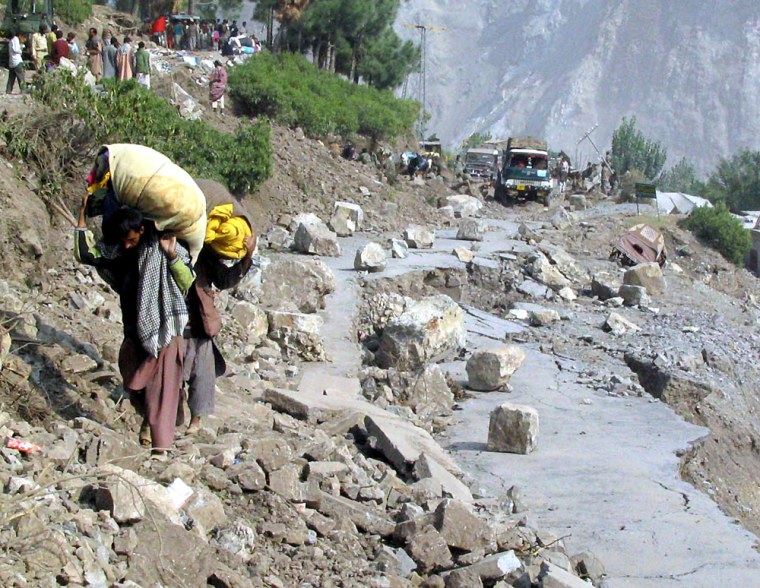Three wars, countless skirmishes and endless cross-border shelling did little to damage the resolve of the Hayat family.
For years they refused to abandon their life in the Neelam Valley section of Kashmir, a disputed region claimed by Pakistan and India. They loved its lush green mountains and slopes — and, most important, the fact that it was the home of their ancestors and extended family.
But in the wake of the Oct. 8 quake that killed more than 53,000 people and seriously injured more than 75,000, they decided to leave their land behind forever.
Sense of ‘betrayal’
Sitting on the dirt track which was once a road leading into the Neelam Valley from Muzaffarabad, the devastated capital of Pakistani-controlled Kashmir, Khurram Hayat remembered his father, Mohammed, who died last year at the age of 89.
“He would hold us together through those long nights when shells would be falling all around, quietly telling us that we were safe in our home,” said Hayat as an older brother, elderly mother and other members of the family slowly swallowed dried walnuts, their first food of the day.
Hayat told how his oldest brother, who lives in Lahore, a major city in central Pakistan, would always try to convince his parents and other family members to move away.
But, Hayat explained, his father would always dismiss the entreaties, saying that he and his other children would never abandon his home.
“But here we are today,” said Hayat, as he fought back tears and tried to give suitable words to his “betrayal” of the land of his elders.
Hayat, 43, his wife and two children, aged two years and six months, are going to Lahore. Along with his mother, another brother, sister-in-law and their 2-year-old son, they had hiked up and down steep mountains for 22 hours in order to reach the remains of road to Muzaffarabad.
“There is nothing for us to come back to,” he said. “Even the graves of our forefathers have been washed away with the landslides caused by tremors that day of October 8.
“We lost everything that we owned or possessed. Our home, cattle, herds, cultivated land, gardens … everything.”
Fortunate to have somewhere to go
For all their misfortune, however, the Hayat family count themselves as actually quite lucky.
Apart from the fact that they are among a few who have somewhere to go to outside the 125-mile valley divided between India and Pakistan, no one in their immediate family was killed (though some of the 21 bodies recovered from the debris of their village, Balgran, included extended family).
But the damage from the 7.6 earthquake proved too much to bear.
“We waited for the government to come to our rescue for more than a week,” said Hayat. “But when nothing came our way on the 10th day and we ran out of our stocks of ration which consisted of fruits and vegetables, we started to have a real bad feeling.”
And that’s when they decided they had to leave.
Access nearly impossible
It’s probably just as well they did.
Dr. Qaisar Jalal was sitting with three colleagues in a truck loaded with medicine and food parked on the Neelam Valley road, right next to the Hayat family. The doctors had been forced to stop their attempted recovery mission because the road ahead essentially no longer existed.
“You see this mountain,” said Jalal, pointing to the high ridge next to the road the Hayat family had just scaled down from. “If we don’t cross this top within a day or two, nobody knows how many lives we are going to lose up there.
“People living beyond these mountains are in real trouble,” he added. “It has already started snowing on higher altitudes and within three weeks every mountain will be covered with snow.”
For the moment, the only way of approaching the valley has been with airdrops by helicopters, but even that has not been ideal — helicopters cannot land on the steep slopes of the valley and much of what they drop has been rolling down into the river, according to Jalal.
The only way of reaching people is to go to them by foot. But that is not happening either. Out of his four-member medical team, Jalal was the only one who would take the journey.
Can't say goodbye forever
While the Hayat family took a nap after their roadside meal, other people emerged from the ruined road to collect food and medicine and then scale back up the mountain to return to their families and land.
As they left, Hayat got up. After making sure his elder brother and mother were asleep, he confided, “I am going to come back here some day because I know that my father’s grave is the only one not washed away by the landslides.”
Why was he being so secretive?
“Well, had my mother and elder brother known this, they would have never left our land,” he said as he closed his eyes.
